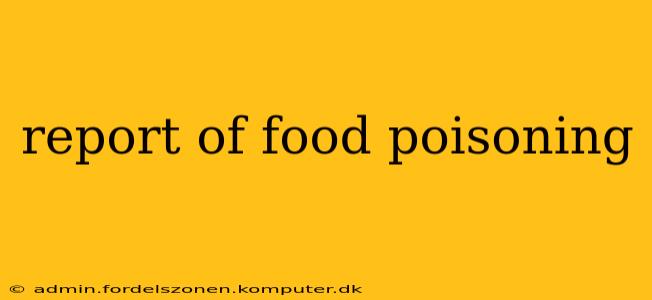Food poisoning, also known as foodborne illness, is a distressing experience caused by consuming contaminated food or drinks. Knowing how to report a case is crucial for public health, preventing further illness, and identifying the source of the contamination. This guide will walk you through the process, addressing common questions and concerns.
What should I do if I think I have food poisoning?
First and foremost, seek medical attention if your symptoms are severe. Severe symptoms include high fever, bloody diarrhea, persistent vomiting, dehydration, and signs of shock. These require immediate medical intervention. For milder cases, focus on rehydration by drinking plenty of clear fluids like water, broth, or electrolyte solutions. Avoid solid foods until symptoms subside. Rest is also crucial for recovery. Keep a detailed record of your symptoms, when they started, and what you ate in the preceding hours or days. This information will be invaluable if you choose to report the incident.
How do I report a case of food poisoning?
Reporting a case of food poisoning varies depending on your location. Generally, you should contact your local health department. Many health departments have online reporting systems, while others may require a phone call. Be prepared to provide detailed information, including:
- Your symptoms: Describe the specific symptoms you experienced, when they started, and their severity.
- The food you consumed: Be as specific as possible about the food items you ate, including brands, where you purchased them, and when you consumed them.
- Your location: Note where you consumed the food, whether at home, a restaurant, or another location.
- Other individuals affected: If others who consumed the same food are experiencing similar symptoms, include their details as well.
What information will the health department need?
The health department will need detailed information to investigate your report. They will likely ask questions about:
- The onset of symptoms: Precise timing is important for tracing the source of the contamination.
- The food items: Specific details such as the brand, packaging, and lot number can help identify contaminated batches.
- The location of purchase: This information will help health officials target specific establishments or suppliers.
- Preparation methods: If you prepared the food yourself, describe the methods used to ensure they can assess any potential contamination points.
What happens after I report food poisoning?
After reporting, health officials will investigate your report, potentially contacting others who may have consumed the same food. They might inspect the establishment where the food was purchased or prepared and collect samples for testing. This process helps identify the source of the contamination and prevent further outbreaks.
Can I report food poisoning anonymously?
In most cases, you can report food poisoning anonymously. However, providing as much detail as possible will aid the investigation and help prevent future incidents. The anonymity of your report will depend on the policies of your local health department.
What if I got food poisoning from a restaurant?
If you suspect you got food poisoning from a restaurant, you should still contact your local health department. You may also want to contact the restaurant directly and inform them of your experience. Keep any receipts or photographs as evidence.
What if I'm unsure if it's food poisoning?
If you're uncertain about the cause of your illness, it's still best to contact your healthcare provider and potentially your local health department. They can help determine the cause of your illness and provide appropriate advice.
This information is for general guidance only and should not be considered medical advice. Always consult a healthcare professional for diagnosis and treatment of any illness. The procedures for reporting food poisoning may vary depending on your location; consult your local health department's website or contact them directly for specific instructions.
